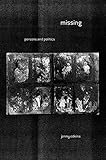Missing : Persons and Politics / Jenny Edkins.
Material type: TextPublisher: Ithaca, NY : Cornell University Press, [2011]Copyright date: ©2016Description: 1 online resource (296 p.)Content type:
TextPublisher: Ithaca, NY : Cornell University Press, [2011]Copyright date: ©2016Description: 1 online resource (296 p.)Content type: - 9780801462795
- Dead -- Identification -- Political aspects
- Disappeared persons -- Identification -- Political aspects
- Mass casualties -- Identification -- Political aspects
- Missing in action -- Identification -- Political aspects
- Missing persons -- Identification -- Political aspects
- Philosophy
- Political Science & Political History
- POLITICAL SCIENCE / Human Rights
- 362.87 23
- HV6762.A3 E35 2016
- online - DeGruyter
| Item type | Current library | Call number | URL | Status | Notes | Barcode | |
|---|---|---|---|---|---|---|---|
 eBook
eBook
|
Biblioteca "Angelicum" Pont. Univ. S.Tommaso d'Aquino Nuvola online | online - DeGruyter (Browse shelf(Opens below)) | Online access | Not for loan (Accesso limitato) | Accesso per gli utenti autorizzati / Access for authorized users | (dgr)9780801462795 |
Browsing Biblioteca "Angelicum" Pont. Univ. S.Tommaso d'Aquino shelves, Shelving location: Nuvola online Close shelf browser (Hides shelf browser)

|

|

|

|

|

|

|
||
| online - DeGruyter The Business of Empire : United Fruit, Race, and U.S. Expansion in Central America / | online - DeGruyter Witches, Wife Beaters, and Whores : Common Law and Common Folk in Early America / | online - DeGruyter Small Works : Poverty and Economic Development in Southwestern China / | online - DeGruyter Missing : Persons and Politics / | online - DeGruyter Making and Faking Kinship : Marriage and Labor Migration between China and South Korea / | online - DeGruyter Cultivating the Masses : Modern State Practices and Soviet Socialism, 1914–1939 / | online - DeGruyter China's Regulatory State : A New Strategy for Globalization / |
Frontmatter -- Contents -- Preface -- Acknowledgments -- Introduction -- 1. Missing Persons, Manhattan -- 2. Displaced Persons, Postwar Europe -- 3. Tracing Services -- 4. Missing Persons, London -- 5. Forensic Identification -- 6. Missing in Action -- 7. Disappeared, Argentina -- 8. Ambiguous Loss -- Conclusion -- Notes -- Bibliography -- Index
restricted access online access with authorization star
http://purl.org/coar/access_right/c_16ec
Stories of the missing offer profound insights into the tension between how political systems see us and how we see each other. The search for people who go missing as a result of war, political violence, genocide, or natural disaster reveals how forms of governance that objectify the person are challenged. Contemporary political systems treat persons instrumentally, as objects to be administered rather than as singular beings: the apparatus of government recognizes categories, not people. In contrast, relatives of the missing demand that authorities focus on a particular person: families and friends are looking for someone who to them is unique and irreplaceable. In Missing, Jenny Edkins highlights stories from a range of circumstances that shed light on this critical tension: the aftermath of World War II, when millions in Europe were displaced; the period following the fall of the World Trade Center towers in Manhattan in 2001 and the bombings in London in 2005; searches for military personnel missing in action; the thousands of political "disappearances" in Latin America; and in more "idian circumstances where people walk out on their families and disappear of their own volition. When someone goes missing we often find that we didn’t know them as well as we thought: there is a sense in which we are "missing" even to our nearest and dearest and even when we are present, not absent. In this thought-provoking book, Edkins investigates what this more profound "missingness" might mean in political terms.
Mode of access: Internet via World Wide Web.
In English.
Description based on online resource; title from PDF title page (publisher's Web site, viewed 26. Apr 2024)


